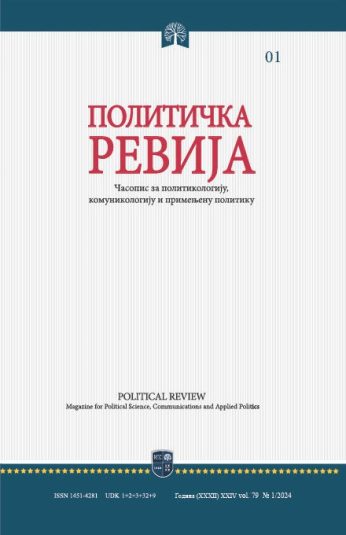Тема броја
КУЛТУРА, ПОЛИТИКА, БЕЗБЕДНОСТ
ОБАВЕШТАЈНА АКТИВНОСТ У СИСТЕМУ ПОЛИТИЧКЕ ВЛАСТИ
Сажетак
Обавештајна активност као друштвени и политички феномен представља један од кључних информационих канала којима се носиоци политичке власти информишу о приликама и променама у спољном окружењу, које су од значаја за националну безбедност и националне интересе. Као битан елемент информационе, односно, меке моћи сваке државе, обавештајна активност своју институционализацију доживљава кроз деловање савремених обавештајних службы као специјализованих установа извршне власти. С друге стране, обавештајна активност има јасно дефинисану улогу у процесу доношења (спољно)политичких одлука, јер носиоцима политичке власти обезбеђује релевантна и правовремена завршна обавештајна знања као основ за даљи тог процеса одлучивања. Посебан значај у процесу обавештајног истраживања, односно обавештајном циклусу, има анализирање, продукција и интерпретација тих сазнања, као и правилно дефинисање информационих/обавештајних потреба и захтева од стране носилаца политичке власти. У овим тачкама се и прелама сва осетљивост сложених односа између обавештајне активности и политичке власти.
Референце
- Betts, Richard K., Mahnken, Thomas G. (eds), Paradoxes of Strategic Intelligence, London & Portland Or, Frank Cass, 2005.
- Betts, Richard K., Enemies of Intelligence: Knowledge and Power in American National Security, New York, Columbia University, 2007.
- Banks, Chuck., Covert Action: An Instrument ofForeign Policy, Maxwell AFB, AL, Air War College, 1994.
- Holsti, Ole R., Making American foreign policy, New York, Routledge,Taylor & Francis Group, 2006.
- Drezner, Daniel W. (ed), Avoiding trivia: the role of strategic planning in American foreign policy, Washington, D.C., The Brookings Institution, 2009.
- National Intelligence Council, Mapping the Global Future, Washington, Government Printing Office, 2004.
- Johnson, Stuart, Libicki, Martin, Treverton,Gregory F. (eds), New challenges, new tools for defense decisionmaking, Santa Monica, RAND, 2003.
- Intelligence Estimates: How Useful to Congress? Washington, DC, Congressional Research Service, Library of Congress, 2006, Internet 13/03/2010, http://www.fas.org/sgp/crs/intel/RL33733.pdf.
- U.S. Intelligence and Policymaking: The Iraq Experience, Washington, DC, Congressional Research Service, Library of Congress, 2006, Internet 13/03/2010, http://italy.usembassy. gov/pdf/other/RS21696.pdf.
- Dunn, William L. “Intelligence and Decisionmaking.” In Alfred C. Maurer, et al. (eds.) Intelligence Policy and Process, Boulder, CO, Westview Press, 1985, p. 220-234.
- Gill, Peter, “Democratic and Parliamentary Accountability of Intelligence Services after September 11th”, DCAF, Working paper no. 103. January
- Hulnick, Arthur S., Fixing the Spy Machine: Preparing American Intelligence for the Twenty First Century, Westport, CT, Praeger, 1999.
- Kent, Sherman, Strategic Intelligence for American World Policy, Princeton, NJ, Princeton University Press, 1949.
- Teitelbaum, Lorne, The Impact of the Information Revolution on Policymakers ’ Use of Intelligence Analysis, Santa Monica, CA, Pardee Rand Graduate School, 2005.
- United States. Central Intelligence Agency, Intelligence and Policy: The Evolving Relationship, Washington, DC, Central Intelligence Agency, 2004.
- Andrus, D. Calvin. “Toward a Complex Adaptive Intelligence Community”, Studies in Intelligence, 2005, Vol. 49, No. 3, p. 63-70.
- Treverton, Gregory F., Gabbard, Bryan C., Assessing the Tradecraft of Intelligence Analysis, Santa Monica, Rand, 2008.
- Treverton, Gregory F., The Next Steps in Reshaping Intelligence, Santa Monica, CA, Rand, 2005.
- Treverton, Gregory F., Reshaping National Intelligence for an Age of Information, Cambridge: Cambridge University Press, 2001.
- Davis, Jack. “Improving CIA Analytic Performance: Analysts and the Policymaking Process”, Sherman Kent Center for Intelligence Analysis Occasional Papers, 2002, Vol. 1, No. 2, p. 1-19.
- Davis, Jack, Tensions in Analyst-Policymaker Relations: Opinions, Facts, and Evidence, Sherman Kent Center for Intelligence Analysis Occasional Papers, 2003, Vol. 2, No. 2, p. 1-13.
- Gray, David H., Slade, Chris, “Applying the Intelligence Cycle Model to Counterterrorism Intelligence for Homeland Security”, European Journal of Scientific Research, Vol.24 No.4 (2008), pp.498-519.
- Gill, Peter, Marrin, Stephen, Phythian, Mark (eds), Intelligence Theory: Key questions and debates, London and New York: Routledge, 2009.
- Ferris, John Robert, Intelligence and strategy (Selected Essay), New York, Routledge, 2005.
- Nye, Joseph S., The Powers to Lead, Oxford, Oxford University Press, 2008.
- Keohane, Robert O., Nye, Joseph S., Power and Interdependence (third ed.), New York, Longman, 2001.
- Бајагић, Младен, Обавештајна активност и спољна политика – студија случаја САД, Београд, Виша школа унутрашњих послова, 2004.
- Johnson, Loch K., Strategic Intelligence 4: Counterintelligence and Counterterrorism: Defending the Nation Against Hostile Forces, Westport, Connecticut, London, Preager Sevurity International, 2007.
- Scott, Len, Jackson, Peter, “The Study of Intelligence in Theory and Practice”, Intelligence and National Security, Vol. 19, No. 2, Summer 2004, pp. 139-169.
- Jackson, Peter, Siegel, Jennifer (eds), Intelligence and Statecraft: The Use and Limits of-Intelligence in International Society, Westport, Praeger Publishers, 2005.
- Morgenthay, Hans J., Politics Among Nations: The Struggle ofPower and Peace, Boston, Massachusetts, McGraw-Hill Co., Inc., 1993.
- McDowell, Don, Godman, Jan (eds), Strategic Intelligence: A Handbook for Practitioners, Managers, and Users (Revised ed.), Lanham, Maryland, Toronto, Plymouth, The Scarecrow Press., Inc., 2009.
- Herman, Michael, Intelligence Power in Peace and War, The Royal Institute of International Affairs, Cambridge University Press, 2008.
- Boyce R., Maiolo J., (eds), The Origins of World War, Two: The Debate Continues, Basingstoke, Palgrave, 2003.
- Dombrowski, Peter, Payne, Roger A., ’’Global Debate and the Limits of the Bush Doctrine”, International Studies Perspective, No. 4 (2003), pp. 395-408.
- Svendsen, Adam, “The globalization of intelligence since 9/11: frameworks and operational parameters”, Cambridge Review of International Affairs, Vol. 21, No. 1, March 2008, pp. 129-144.
- Johnson, Loch K. (ed), Handbook of Intelligence Studies, New York, Routledge, 2007.
- Krizan, Lisa, Intelligence Essentials for Everyon, Occasional Paper Number Six, Joint Military Intelligence College,Washington, DC., 1999.
- Johnson, Loch K., “Bricks and Mortar for a Theory of Intelligence”, Comparative Strategy, 22(2003), pp. 1-28.
- Савић, Андреја, Бајагић, Младен, ”Улога обавештајне активности у спољној политици”, Наука-безбедност-полиција, вол. VIII, бр. 1 (2003), стр. 17-50;
- Frankel, Joseph, The Making of Foreign Policy (An Analysis of decision Making), London, Oxford University Press, 1968.
- Waltz, Edward, Knowledge Management in the Intelligence Enterprise, Artech House Boston & London, 2003.
- Hastedt, Glenn, Espionage: A Reference Handbook, Santa Barbara, ABCCLIO, 2003.
- The 9/11 Commission Report, Final Report of the National Commission on Terrorist Attacks Upon the United States, New York: W.W. Norton, 2004.

